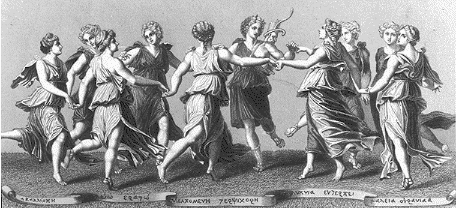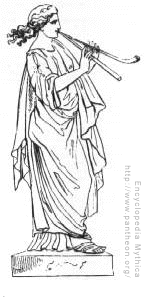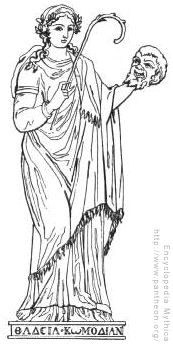The Muses

"[The Muses] are all of one mind, their hearts are set upon song and their spirit is free from care. He is happy whom the Muses love. For though a man has sorrow and grief in his soul, yet when the servant of the Muses sings, at once he forgets his dark thoughts and remembers not his troubles. Such is the holy gift of the Muses to men."
~Hesiod~
It is well known (or it should be) that there were nine Muses who played, sang, danced, and inspired others to do the same. But there are other stories as well. Before the Classical idea of the nine Muses, Pausanias tells us of three Muses, different altogether from the nine we know. They were: - Melete, or Practice
- Mneme, or Memory
- Aeode, or Song
These were, I suppose, the three important parts of music, but Cicero added another to the three originals named Telsiopes. It was only later, when a Macedonian named Pierus came to Thespiae (where the Muses were known and worhipped) and renamed them the names of the nine Muses we know so well today. There are different stories of how those names were chosen. Some say Pierus only did this to make himself seem wiser. Some say it was what he found out from an oracle. Some say it he got word from a Thracian who happened to know (Thracians were more religious than Macedonians, and much wiser too). Many said that Pierus had nine daughters with the same names as the Muses and that the so-called children of the Muses were actually the children of Pierus' daughters. A poet named Mimnermus said there were two types of Muses, there were the old ones, the daughters of Uranus (the Heavens), and young ones (daughters of Zeus). Near the temple of the Muses is a portrait of their nurse, Eupheme.
Back to Classical Mythology. The Muses were sweet and gentle, but when they were challenged they were just as terrible as any other goddess. One man, Thamyris (who was the first man interested in other men, and had a thing for Hyacinthus for a while), was a beautiful minstel who challenged the Muses to a contest. If he won, he would lay with all of them, but if he lost, they were free to take anything they wanted. He lost, of course, and the Muses took his eyes and his minstrelsy as their prize.
There are cool stories about each of the Muses, and some other Muses you probably didn't know about. For example, Did you know Clio introduced the Phoenician alphabet to Greece? Si, sono veritabile.
Calliope Beautiful voice
Chief of the nine Muses. She was the patron of epic poetry. Calliope was the mother of Orpheus by the King of Thrace. There is a great story about Orpheus coming to the Myth Pages. Her symbol was a writing tablet. Calliope was probably the most mythically involved of the Muses, and you can find her on this site as the arbiter in the dispute between Aphrodite and Persephone over Adonis (check it out). Calliope was also sometimes called the mother of Hymen (the god of marriage), Ialemus (sad song god), the Corybantes, the Sirens, etc. They're all very musical children, of course.k |
 |
Clio Proclaimer
One of the nine Muses. She was the patron of history, and inventor of historical and heroic poetry. From a union with King Pierus she bore a son, Hyacinthus. He was a handsome lad who was killed by his lover, Apollo. From his blood grew the flower that bears his name. She was also the person who brought the Phoenician alphabet to Greece. Her symbol was a scroll. |
 |
Erato Passionate or Lovely
The Muse of lyric poetry about love and eroticism. Ooooooh. She was also the patron Muse of parrots and crows, considering that she was the Muse of Mimicry, as well. I like her. |
 |
Euterpe Rejoicing Well or Pleasure Giver
The Muse of lyric poetry and music. But not ONLY that, she was also the cheerful muse (you know, there's always a cute one, a hard core one, a cheerful overly chipper one, well that would be Euterpe). She was in charge of joy and pleasure and . . . are you ready? FLUTE playing! Oh yes. How pleasureful. Her attribute was the double flute, that some say she invented (though I prefer the version that gave it's copyright to Athena. |
 |
Polyhymnia Many Songs
Okay, Polyhymia is the somber and beautiful one. She was the Muse of Sacred Hymn, and of Eloquence. She is shown in pictures as a serious woman usually in a position of meditation or thoughtfulness, sometimes with a finger to her mouth in thought. She wears long robes. |
 |
Melpomene Songstress
One of the Muses. She was the muse of Tragedy and that was it. She is often showing wearing the cothurnus (ie, boots traditionally worn by tragic actors), and she usually carries or wears the tragic mask. Sometimes she also carries a knife or club. |
 |
| Terpsichore Rejoicing in the Dance or WhirlingThe Muse of dancing and choral singing. She could be recognized because she was the one dancing around with a lyre in her hands. Like her sister Calliope, Tersichore was a mother. Some say she bore the Sirens with the River God Achelous. The sagas of Thebes call her the mother of Linus by Apollo (others say Calliope and more ancient texts call Urania the true mother - see Urania for his story), also Hymen (like Calliope). |
 |
Thalia Festive or Flourishing
One of the nine Muses. She presided over comedy and pastoral poetry which explains why she holds a comic mask. But Thalia is the "country girl" of the group. She loves to traipse about meadows and forests and rural places that a city girl like me wouldn't know about. That's why she carries the shepherd's crook, as well. |
 |
Urania Mountain Queen
Muse of astronomy and astrology (One of the nine Muses). Mother of a son Linus. His father was Amphimarus (a son of Poseidon), and that he became such a beautiful singer that Apollo grew jealous and killed him. For this, Linus is sacrificed to before the Muses as a hero. Urania is often pictured carrying a globe in one hand and a pair of compasses in the other. They say that Urania inspires only chaste love - but that's really more using Urania as an epithet of Aphrodite's - and in classical tradition she rests her foot on a turtle (the symbol of silence and retreat). |
 | |
Homepage |
The Famous Ones |
Goddesses |
Humans |
Nymphs |
Monstresses & Monstrosities |
The Myths Pages |
Amazons |
Men |
Terms |
Gallery |
Dreambook |
References & Links
Contact me at ailiathena@yahoo.com
Last Updated February 26,2006
|
